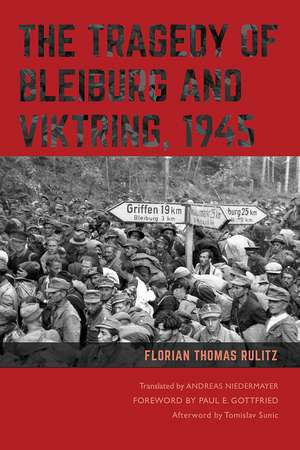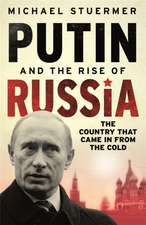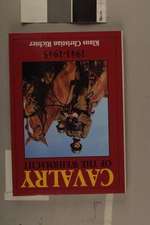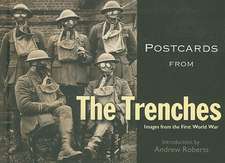The Tragedy of Bleiburg and Viktring, 1945
Autor Florian Thomas Rulitz Traducere de Andreas Niedermayer Cuvânt înainte de Paul E. Gottfrieden Limba Engleză Paperback – 6 mar 2016
The atrocities and mass murders committed by Josip Broz Tito’s Partisan units of the Yugoslav Army immediately after the Second World War had no place in the conscience of Socialist Yugoslavia. More than once, the annual Croatian commemoration of the Bleiburg victims was subject to attacks carried out by the socialist Yugoslav state. Abroad in the West, on Austrian soil, the Yugoslav secret service (UDBA) did not shy away from murdering the protagonist of the Croatian memory culture, Nicola Martinovic, as late as 1975. The official history was aligned with a firm interpretational paradigm that called for a glorification of the anti-fascist “people’s liberation resistance.” With the breakup of Yugoslavia and its socialist regime in 1991, the identity-establishing accounts of contemporary witnesses, which had mainly been cherished in exile circles abroad, increasingly reached public awareness in Croatia and Slovenia.
In the 1990s Croatia witnessed the emergence of a memory that had been suppressed by the socialist-Yugoslav regime—namely the Bleiburg tragedy. The situation in Slovenia was similar in terms of identity and remembrance culture. Among the Slovenes, the communist crimes committed during the turmoil are known as the drama of Viktring or the Viktring tragedy, named after the largest refugee camp of the Slovenes. Reports on the communist postwar crimes and on the countless discoveries of mass gravesites have also begun circulating in the media of the German-speaking world in the last few years.
Florian Rulitz’s meticulously researched book, now available for the first time in English, provides a corrective to the historical memory that had been previously accepted as truth. Rulitz focuses on two essential questions. First, did the so-called “final encirclement battles” indeed occur in Carinthia in the Ferlach/Hollenburg/Viktring and Dravograd/Poljana/Bleiburg areas, resulting in military victories for the Yugoslav Army? Second, were the battles after the capitulation fought by the refugees with the aim of reaching the British-controlled areas in Carinthia? To answer these questions, Rulitz presents a detailed reconstruction of those days in May 1945. He furthermore considers the question of the murders on Austrian territory, which were hushed up in Partisan literature and presented as casualties of the final military operations. This groundbreaking study will interest scholars and students of modern European history.
In the 1990s Croatia witnessed the emergence of a memory that had been suppressed by the socialist-Yugoslav regime—namely the Bleiburg tragedy. The situation in Slovenia was similar in terms of identity and remembrance culture. Among the Slovenes, the communist crimes committed during the turmoil are known as the drama of Viktring or the Viktring tragedy, named after the largest refugee camp of the Slovenes. Reports on the communist postwar crimes and on the countless discoveries of mass gravesites have also begun circulating in the media of the German-speaking world in the last few years.
Florian Rulitz’s meticulously researched book, now available for the first time in English, provides a corrective to the historical memory that had been previously accepted as truth. Rulitz focuses on two essential questions. First, did the so-called “final encirclement battles” indeed occur in Carinthia in the Ferlach/Hollenburg/Viktring and Dravograd/Poljana/Bleiburg areas, resulting in military victories for the Yugoslav Army? Second, were the battles after the capitulation fought by the refugees with the aim of reaching the British-controlled areas in Carinthia? To answer these questions, Rulitz presents a detailed reconstruction of those days in May 1945. He furthermore considers the question of the murders on Austrian territory, which were hushed up in Partisan literature and presented as casualties of the final military operations. This groundbreaking study will interest scholars and students of modern European history.
Preț: 358.09 lei
Nou
Puncte Express: 537
Preț estimativ în valută:
68.52€ • 71.72$ • 57.03£
68.52€ • 71.72$ • 57.03£
Carte tipărită la comandă
Livrare economică 31 martie-14 aprilie
Preluare comenzi: 021 569.72.76
Specificații
ISBN-13: 9780875807225
ISBN-10: 0875807224
Pagini: 290
Ilustrații: 20
Dimensiuni: 152 x 229 x 28 mm
Greutate: 0.5 kg
Ediția:1
Editura: Northern Illinois University Press
Colecția Northern Illinois University Press
ISBN-10: 0875807224
Pagini: 290
Ilustrații: 20
Dimensiuni: 152 x 229 x 28 mm
Greutate: 0.5 kg
Ediția:1
Editura: Northern Illinois University Press
Colecția Northern Illinois University Press
Recenzii
“Based upon impressive research, Rulitz’s study shows that thousands of anticommunist refugees were murdered by Tito’s Partisans—in many cases after having been repatriated by the British as the price for a Yugoslav Army withdrawal from Austrian territory. In his attempt to correct historical memory, Rulitz has written an important and original book.”—Lee Congdon, author of Seeing Red: Hungarian Intellectuals in Exile and the Challenge of Communism (NIU Press, 2001)
"Rulitz’s book offers the first in-depth analysis in English from an Austrian perspective, which allows him to address the fate of all of the various groups that found themselves in southern Carinthia in May 1945. Rulitz deserves to be commended for his impressive fieldwork."
—European History Quarterly
"Rulitz’s book offers the first in-depth analysis in English from an Austrian perspective, which allows him to address the fate of all of the various groups that found themselves in southern Carinthia in May 1945. Rulitz deserves to be commended for his impressive fieldwork."
—European History Quarterly
Notă biografică
Florian Thomas Rulitz is a historian of contemporary Alps-Adriatic military history.














